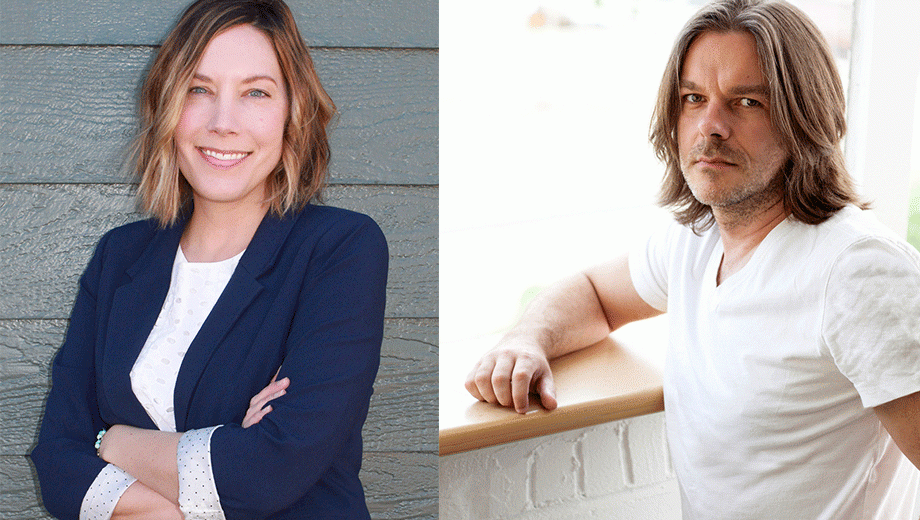Fiction authors Emily Littlejohn, AM’02, and Sylvain Neuvel, PhD’03, discuss how they wrote their first novels—and what they learned about writing their next books.
How did Littlejohn and Neuvel land their first publishing deals? To find out, check out their Q&A in the Spring 2017 Tableau.
What’s your writing process like?
EL: When I decided to write Inherit the Bones, it kind of came to me all at once. The first thing that came to me was the first line of the book: “In my dreams, the dead can speak.” The second thing was this image of a clown, who’s the victim at the beginning of the book. The thought in my head was, “Who’s the person behind the makeup?” The third thing was that I wanted to write a story set in a small town in Colorado. Those three things all gelled together, and from there the story took on a life of its own.
My second book—I sold these as a two-book deal—was much more planned. I’m working on the third book now, and with that one I’m very much trying to plot it out. I like the creative side of flying by the seat of your pants, but it’s also easy to get into these rabbit holes where all of a sudden you’ve written 10 or 15 pages of really good material that doesn’t further the story at all.
SN: With Sleeping Giants, I was only writing for the fun of it, so there was really no point in going through a big plotting step. As soon as I realized it was actually pretty good and there might be something to it, I stopped and I planned. At one point I was rereading myself to figure out what was going to happen next, and I started smiling. Smiling is a good sign. I really wanted to read more, and I thought maybe I wasn’t the only one, so it might be worth trying to get it out there.
But I need to plot, otherwise I stress out—especially now that I have a contract. It’s one thing to write for the fun of it. The first book you can write at whatever speed you want. But book two is a little weirder because you’ve been paid for it already, and you start doubting yourself. You don’t want to get consumed by all that stress and self-doubt. I need the safety net of the well-structured plot. I go into a lot of detail, and then I feel safer when I’m writing.
Any advice for aspiring authors?
EL: The second you feel like it might be something you want to pursue or you have an idea, start sooner rather than later because it can be a long process. That first book took me three or four years while writing it as a hobby and working full time. Before that, it was probably two to three years of just drafts of other things that will never see the light of day.
It doesn’t happen overnight. It takes a lot of practice. You have to make the time commitment; you have to put the effort in. But if you do those things, you could end up with a really good product that you can be proud of. Some people think, “I have to wait until the muse strikes,” or, “I have to wait for the perfect submission.” Those things are never going to happen, so just start.
SN: The only advice I could give anyone, really, is to write a good book, something you can be proud of, and own it. That’s actually more important than writing a good book, because after that, everything else—and I mean everything—is totally out of your control.
If you put your self-worth on the line for a process that you have absolutely no play in, then you’re going to get hurt. It’s easier said than done, but put the effort into the book. That’s the only thing you can control.

